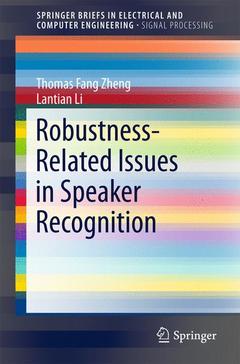Description
Robustness-Related Issues in Speaker Recognition, 1st ed. 2017
SpringerBriefs in Signal Processing Series
Authors: Zheng Thomas Fang, Li Lantian
Language: English
Subject for Robustness-Related Issues in Speaker Recognition:
Approximative price 52.74 €
In Print (Delivery period: 15 days).
Add to cartSupport: Print on demand
Description
/li>Contents
/li>Biography
/li>Comment
/li>
This book presents an overview of speaker recognition technologies with an emphasis on dealing with robustness issues. Firstly, the book gives an overview of speaker recognition, such as the basic system framework, categories under different criteria, performance evaluation and its development history. Secondly, with regard to robustness issues, the book presents three categories, including environment-related issues, speaker-related issues and application-oriented issues. For each category, the book describes the current hot topics, existing technologies, and potential research focuses in the future. The book is a useful reference book and self-learning guide for early researchers working in the field of robust speech recognition.
Speaker Recognition: Introduction.- Environmental-Related Robustness Issues.- Speaker-Related Robustness Issues.- Application-Oriented Robustness Issues.- Conclusions and Future Work.
Thomas Fang Zheng (M'99-SM'06) received his Ph.D. degree in computer science and technology from Tsinghua University, Beijing, China, in 1997. He is now a Research Professor and Director of the Centre for Speech and Language Technologies, Tsinghua University. His research focuses on speech and language processing. He has published more than 250 papers and plays active roles in a number of communities, including the Chinese Corpus Consortium (council chair), the Standing Committee of China’s National Conference on Man-Machine Speech Communication (chair), Subcommittee 2 on Human Biometrics Application of Technical Committee 100 on Security Protection Alarm Systems of Standardization Administration of China (deputy director), the Asia-Pacific Signal and Information Processing Association (APSIPA) (Vice-President and Distinguished Lecturer 2012-2013), Chinese Information Processing Society of China (council member and Speech Information Subcommittee Chair), the Acoustical Society of China (council member), and the Phonetic Association of China (council member). He was an Associate Editor of the IEEE Transactions on Audio, Speech and Language Processing and the APSIPA Transactions on Signal and Information Processing. He is also on the editorial board of Speech Communication, Journal of Signal and Information Processing, Springer Briefs in Signal Processing, and the Journal of Chinese Information Processing, etc.
Lantian Li received his B.Sc. degree in China University of Mining and Technology, Beijing in 2013. Since 2013, he has been with the Centre for Speech and Language Technology (CSLT), Tsinghua university as a PhD student. His research interest is speaker recognition with machine learning methods. In May 2016, He received the first-class excellent PhD student award of RIIT, Tsinghua University, due to his cut-edging research on speaker recognition.
Exhaustively reviews the key recent research into state-of-the-art speaker recognition technologies
Simplifies a complicated picture of the robustness issues in speaker recognition in three main categories
Covers the current hot topics, existing technologies and potential future developments of each category
Includes supplementary material: sn.pub/extras
These books may interest you

Speaker Authentication 158.24 €



